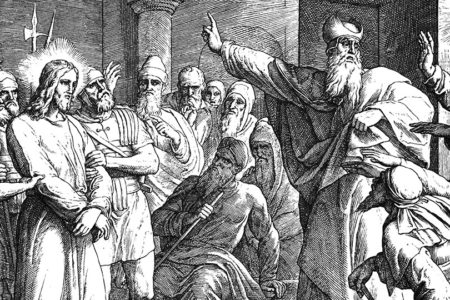The Witness of Scripture Concerning Its Inspiration: Part Three
The previous article in this series began to present the Bible’s witness concerning its divine nature. This article provides two additional examples of that witness.
The Old Testament’s Witness Concerning Its Divine Nature
More than two thousand times the Old Testament claims to be the record of what God has said to mankind. We shall take a few examples of this witness from the three major divisions of the Hebrew Old Testament: The Law (Torah)—Genesis, Exodus, Leviticus, Numbers, Deuteronomy; The Prophets (Nebhiim)—Joshua, Judges, Samuel, Kings, Isaiah, Jeremiah, Ezekiel, The Twelve; and The Writings (Kethubhim)—Psalms, Proverbs, Job, Song of Songs, Ruth, Lamentations, Esther, Ecclesiastes, Daniel, Ezra, Nehemiah, and Chronicles.
The Law: Exodus 24:4 states, “And Moses wrote all the words of the Lᴏʀᴅ.” Fifty-four times the Book of Numbers declares that it is the record of what God said to Moses.
The Prophets: Twenty times the Book of Isaiah claims that it presents God’s Word (e.g., Isa. 1:2, 10).
The Book of Jeremiah makes the same claim about a hundred times. For example, Jeremiah wrote, “Then the word of the Lᴏʀᴅ came unto me” (1:4), and he declared, “Then the Lᴏʀᴅ put forth his hand, and touched my mouth. And the Lᴏʀᴅ said unto me, Behold, I have put my words in thy mouth” (1:9).
The Book of Ezekiel asserts, “The word of the Lᴏʀᴅ came expressly unto Ezekiel, the priest, the son of Buzi, in the land of the Chaldeans by the river, Chebar; and the hand of the Lord was there upon him” (1:3). At least 44 times Ezekiel declared that the word of the Lord came to him.
Nearly all of the minor prophets claimed that they were presenting God’s Word. In fact, in their opening verses Hosea, Joel, Micah, Zephaniah, Haggai, Zechariah, and Malachi all indicated that they were communicating “the word of the Lord” that came to them.
The writer of 1 Kings testified concerning the divine nature of the Book of Joshua. He recorded the fulfillment of a warning that was “according to the word of the Lᴏʀᴅ, which he spoke by Joshua, the son of Nun” (1 Ki. 16:34).
The Prophet Daniel gave witness regarding the divine nature of the Book of Jeremiah. He wrote, “I, Daniel, understood by books the number of the years, concerning which the word of the Lᴏʀᴅ came to Jeremiah, the prophet, that he would accomplish seventy years in the desolations of Jerusalem” (Dan. 9:2).
The Prophet Zechariah testified concerning the divine nature of the writings of the prophets who ministered before the Babylonian Captivity of the Jews. Referring to the rebellious attitude of the precaptivity Jews, he declared, “Yea, they made their hearts as an adamant stone, lest they should hear the law, and the words which the Lᴏʀᴅ of hosts hath sent in his Spirit by the former prophets; therefore came a great wrath from the Lord of hosts” (Zech. 7:12).
The Writings: King David, “the sweet psalmist of Israel, said, The Spirit of the Lᴏʀᴅ spoke by me, and his word was in my tongue” (2 Sam. 23:1–2). David thereby claimed divine inspiration for his Psalms.
Christ’s Witness Concerning the Divine Nature of the Old Testament
Jesus Christ gave several lines of witness concerning the divine nature of the Old Testament.
First, in Matthew 5:18 Christ said, “For verily I say unto you, Till heaven and earth pass, one jot or one tittle shall in no way pass from the law, till all be fulfilled.” The “jot” is the yod, the smallest letter in the Hebrew alphabet. It was similar in size and shape to our apostrophe. The “tittle” is only a very small part of a Hebrew letter. Through these terms, Jesus emphasized the most minute parts of the Law division of the Hebrew Old Testament.
Kenneth L. Barker, explaining the significance of Christ’s statement, asserted that the Lord “set forth the indestructibility of the law in its smallest details. The inviolability of all of God’s revelation in the Scriptures is, by implication, likewise upheld. The importance of such a minute detail as a yod can be accounted for only by recognizing that Christ regarded the individual words of Scripture as inspired and authoritative, for the change of a letter might well change the whole word and its meaning.”*
Through His statement, Jesus indicated that divine inspiration of the Law division of the Old Testament went even deeper than individual words. It extended to the smallest letters and parts of letters within words. Christ believed in even more than verbal inspiration for the Old Testament.
Christ began His statement with the expression “For verily I say unto you.” This expression was used in ancient times to call attention to a solemn statement that is reliable and true. Jesus thereby emphasized the reliability and truthfulness of His statement concerning the Law division of the Old Testament.
Second, when Satan tempted Jesus, the Lord did not use His miraculous powers as His weapon against the devil and his temptations. Instead, He used the Scriptures like a sword. He reached into the Old Testament, took the passage that fit the nature of each temptation, and thrust it at the devil by speaking it to him (Mt. 4:4, 7, 10).
Christ’s action on this occasion was most significant. Even though He was the Son of God—absolute deity incarnated in human flesh—He submitted Himself to the authority of the Old Testament, the only Scriptures written to that time. He would not violate those Scriptures. He thereby bore witness to the absolute divine authority of the Old Testament.
Third, in Mark 7:6–13 Christ rebuked the Pharisees and scribes for laying aside what Moses wrote—the Law division of the Old Testament—in order to keep man-made traditions.
Two things should be noted concerning this rebuke. First, Jesus equated what Moses wrote in the Law with “the commandment of God” (vv. 8–9) and “the word of God” (v. 13). He thereby testified concerning the divine inspiration of the Law division of the Old Testament. Second, through this rebuke Christ indicated that the Scriptures have authority over man-made tradition. He did not say that all man-made tradition is wrong. He did, however, make it clear that any tradition that is contrary to the Scriptures must be rejected. He thereby gave witness to the divine authority of the Law division of the Old Testament.
Fourth, Christ declared that David wrote Psalm 110:1 by the Holy Spirit (Mk. 12:36). He thereby claimed divine inspiration for that Old Testament passage.
Fifth, referring to a statement in Isaiah 53:12, Jesus said, “this that is written must yet be accomplished in me” (Lk. 22:37). He thereby indicated that the event foretold in this Old Testament passage had to be fulfilled. The only possible reason for this necessity of fulfillment would be divine revelation and inspiration of that passage. Writings totally human in origin do not have to be fulfilled. Thus, Jesus’ statement implied the divine nature of that Old Testament passage.
Sixth, in Luke 24:25 Jesus declared, “O foolish ones, and slow of heart to believe all that the prophets have spoken!” Jesus quickly followed up this statement with the following action: “beginning at Moses and all the prophets, he expounded unto them, in all the scriptures, the things concerning himself” (v. 27). This action indicates that He was equating the entire Old Testament with “all that the prophets have spoken.”
Several things should be noted regarding Christ’s statement and action. First, the expression “foolish ones, and slow of heart” refers to people lacking understanding or judgment. Thus, Christ was saying that when people do not believe the entire Old Testament, it is because they lack understanding or judgment. Second, Christ began His statement with the emotional interjection “O,” indicating that He is disturbed when people do not believe all of the Old Testament. Third, the Lord’s statement indicates that people should believe not just some but “all” of the Old Testament. There can be only one legitimate reason for such all-inclusive belief: the divine inspiration of the entire Old Testament. Thus, Christ’s statement revealed His belief in the plenary inspiration of the Old Testament.
Seventh, in Luke 24:44 Jesus said, “all things must be fulfilled, which were written in the law of Moses, and in the prophets, and in the psalms, concerning me.” He thereby claimed that everything written about Him in all three divisions of the Hebrew Old Testament had to be fulfilled. The only possible reason for this necessity of fulfillment would be divine revelation and inspiration of the content of these divisions. Thus, Christ’s statement implied the divine nature of all of the messianic passages throughout the entire Old Testament.
Eighth, after quoting an Old Testament statement, Jesus declared, “the scripture cannot be broken” (Jn. 10:35). The word translated “broken” means repeal, annul, or abolish. Leon Morris indicated that Jesus’ statement “means that Scripture cannot be emptied of its force by being shown to be erroneous.”* Thus, Jesus insisted that it is impossible for people to free themselves of personal responsibility to the teaching of Scripture by asserting that it is in error. Scripture has serious implications for all human beings, implications that they cannot abolish.
The only way Christ’s declaration could be true is if the ultimate source of Scripture is God. Because Jesus said this in conjunction with an Old Testament passage, He thereby affirmed the divine authority and truthfulness of the Old Testament.
Ninth, Jesus said to God, “thy word is truth” (Jn. 17:17). Jesus used the term “word” to refer to God’s revelation given to mankind. This revelation would include, but not be limited to, the Old Testament. Indeed, in Mark 7:6–13 Jesus equated Old Testament Scripture with “the word of God.”
According to Merrill C. Tenney, the unusual construction of the expression translated “thy word” “implies that the ‘word’ is peculiarly God’s; it originates from him and is qualified by his personality.”* Because the term “word” referred to revelation that included the Old Testament, Jesus thereby indicated the divine source of the Old Testament.
Jesus equated God’s Word with “truth.” Leon Morris indicated that He thereby was saying the following: “Divine revelation is eminently trustworthy…The Father’s Word, all that He has revealed, is of the same kind. It is truth and may therefore be unhesitatingly accepted and acted upon.”* Jesus was asserting the complete trustworthiness of all divine revelation, including the Old Testament.
Conclusion
This article has presented the witness of the Old Testament and Jesus Christ concerning the divine nature of the Old Testament. The next article will examine the testimony of Christ and the apostles concerning the divine nature of the New Testament.







